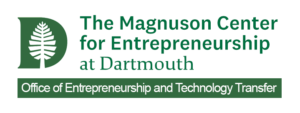Meet the Irving Center
Like the Magnuson Center, the Arthur L. Irving Institute for Energy and Society takes a collaborative approach to innovation. Here’s what you should know about the Magnuson Center’s soon-to-be neighbor.

One of the most important challenges facing entrepreneurs and the world at large is the climate crisis. Rapid innovation and transformation of our society’s reliance on fossil fuels is essential to preserving a habitable planet for future generations.
But confronting climate change is a complex issue that must be looked at through a societal lens. That’s the mission of the Arthur L. Irving Institute for Energy and Society at Dartmouth. The Irving Institute aims to bring together researchers, educators, practitioners and students with an array of background experiences, in order to address one of the biggest challenges our society has faced. Like the Magnuson Center, the Irving Center believes that there is strength in bringing together diverse viewpoints, experiences and approaches.
“The institute will link energy and society, and that’s what we do at Dartmouth. We bring together various approaches and disciplines, to focus on big challenges where we can engage our students in solving real-world problems,” Environmental Sciences Professor Ross A. Virginia said when the institute was announced in 2016.
“The institute’s focus is a great combination—it’s not energy alone, it’s energy and how it connects to people, to society, to broad issues like climate change and environmental justice,” he said. “There’s no other problem facing our global society that’s as important. Any action that Dartmouth can take now—creating new knowledge and new leaders generated from our student body—to solve these issues will have huge impacts on the future of societies around the planet.”
When the West End campus construction project opens later this year, the Magnuson Center and the Irving Center will be housed together, along with the Tuck School of Engineering and the Department of Computer Science. The close proximity is meant to support close collaboration that has proven critical for innovation and meaningful social change.
"At a time when humanity faces grave challenges—access to affordable energy and climate change, public health challenges of historic global magnitude, ongoing threats to cybersecurity—it is imperative that our future leaders and innovators take on a human-centered approach to creating the tools, technology, and systems necessary for improving the human condition," Thayer Dean Alexis Abramson said last year.
Making progress against climate change will require not just innovation, but also entrepreneurial thinking about policy and regulatory changes, alumni active in the energy space said last fall at the Dartmouth Entrepreneurs Forum hosted by the Magnuson Center.
“We won’t solve [the climate crisis] in the next decade by waiting for innovations,” said Scott Jacobs, ’99, CEO & co-founder of Generate. “But we can solve it by understanding, employing and taking advantage of talent and technology that we already have.”
At the new West Campus location, thinkers from the Magnuson Center and the Irving Institute will be able to come together to make those changes.
“Energy is an infrastructure game rather than an invention game”, Jacobs said. “It’s about entrepreneurship in infrastructure rather than the classic Silicon Valley tech model.”
Like the Magnuson Center, the Irving Institute is a resource for both undergraduate and graduate students who have an interest in exploring the intersection of energy and society. The Irving Center also aims to tap into Dartmouth’s rich alumni network, including roughly 6,000 alumni who are actively working in the energy field.
The institute was made possible by a lead gift of $80 million from Irving Oil, the Arthur L. Irving Family Foundation, and Arthur L. Irving, his wife, Sandra Irving, and their daughter, Sarah Irving ’10, Tuck ’14. The institute is committed to supporting research that follows the principles of academic freedom. Learn more here.

